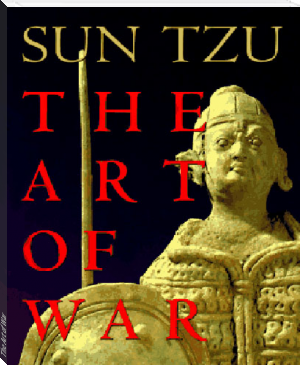The Art of War, Zi Sun [best book recommendations TXT] 📗

- Author: Zi Sun
- Performer: 0976072696
Book online «The Art of War, Zi Sun [best book recommendations TXT] 📗». Author Zi Sun
The sentence quoted above from VI. ss. 21 hardly strikes me as one that could have been written in the full flush of victory. It seems rather to imply that, for the moment at least, the tide had turned against Wu, and that she was getting the worst of the struggle. Hence we may conclude that our treatise was not in existence in 505, before which date Yueh does not appear to have scored any notable success against Wu. Ho Lu died in 496, so that if the book was written for him, it must have been during the period 505-496, when there was a lull in the hostilities, Wu having presumably exhausted by its supreme effort against Ch`u. On the other hand, if we choose to disregard the tradition connecting Sun Wu's name with Ho Lu, it might equally well have seen the light between 496 and 494, or possibly in the period 482-473, when Yueh was once again becoming a very serious menace. [33] We may feel fairly certain that the author, whoever he may have been, was not a man of any great eminence in his own day. On this point the negative testimony of the TSO CHUAN far outweighs any shred of authority still attaching to the SHIH CHI, if once its other facts are discredited. Sun Hsing-yen, however, makes a feeble attempt to explain the omission of his name from the great commentary. It was Wu Tzu-hsu, he says, who got all the credit of Sun Wu's exploits, because the latter (being an alien) was not rewarded with an office in the State. How then did the Sun Tzu legend originate? It may be that the growing celebrity of the book imparted by degrees a kind of factitious renown to its author. It was felt to be only right and proper that one so well versed in the science of war should have solid achievements to his credit as well. Now the capture of Ying was undoubtedly the greatest feat of arms in Ho Lu's reign; it made a deep and lasting impression on all the surrounding states, and raised Wu to the short-lived zenith of her power. Hence, what more natural, as time went on, than that the acknowledged master of strategy, Sun Wu, should be popularly identified with that campaign, at first perhaps only in the sense that his brain conceived and planned it; afterwards, that it was actually carried out by him in conjunction with Wu Yuan, [34] Po P`ei and Fu Kai? It is obvious that any attempt to reconstruct even the outline of Sun Tzu's life must be based almost wholly on conjecture. With this necessary proviso, I should say that he probably entered the service of Wu about the time of Ho Lu's accession, and gathered experience, though only in the capacity of a subordinate officer, during the intense military activity which marked the first half of the prince's reign. [35] If he rose to be a general at all, he certainly was never on an equal footing with the three above mentioned. He was doubtless present at the investment and occupation of Ying, and witnessed Wu's sudden collapse in the following year. Yueh's attack at this critical juncture, when her rival was embarrassed on every side, seems to have convinced him that this upstart kingdom was the great enemy against whom every effort would henceforth have to be directed. Sun Wu was thus a well-seasoned warrior when he sat down to write his famous book, which according to my reckoning must have appeared towards the end, rather than the beginning of Ho Lu's reign. The story of the women may possibly have grown out of some real incident occurring about the same time. As we hear no more of Sun Wu after this from any source, he is hardly likely to have survived his patron or to have taken part in the death-struggle with Yueh, which began with the disaster at Tsui- li. If these inferences are approximately correct, there is a certain irony in the fate which decreed that China's most illustrious man of peace should be contemporary with her greatest writer on war.
The Text of Sun Tzu —————————-
I have found it difficult to glean much about the history of Sun Tzu's text. The quotations that occur in early authors go to show that the "13 chapters" of which Ssu-ma Ch`ien speaks were essentially the same as those now extant. We have his word for it that they were widely circulated in his day, and can only regret that he refrained





Comments (0)